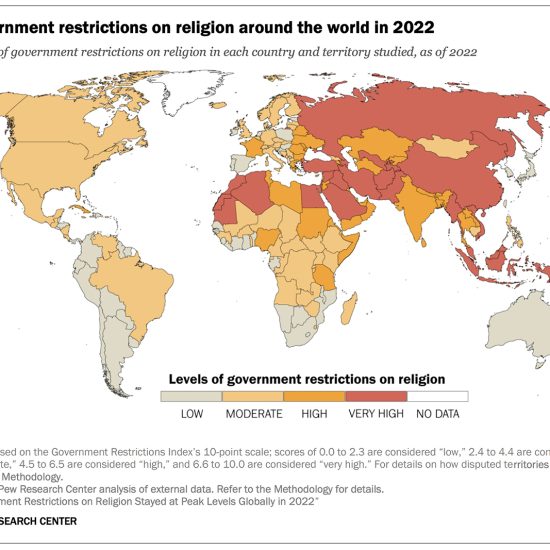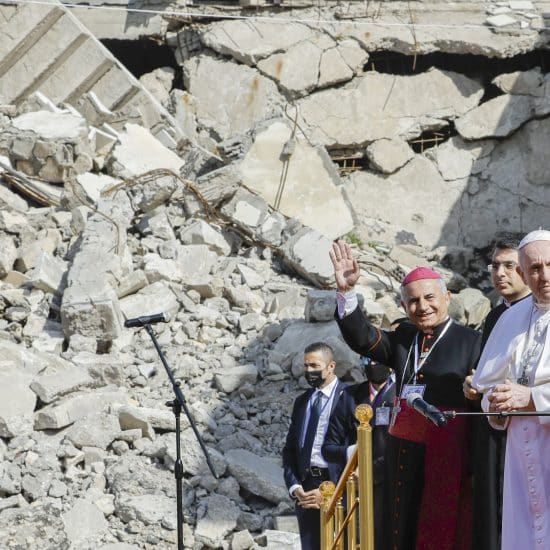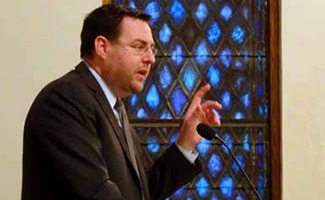WASHINGTON (ABP)—During the holiday season every year, America’s dutiful culture warriors spar over things like whether ecumenical holiday greetings are appropriate for retailers or Christian Nativity scenes should be displayed on courthouse lawns that Jews, Muslims and atheists also pay taxes to maintain.
Inevitably, when department-store chains or courts decide against allowing such religious cultural practices, some Christian leader or group claims it’s an act of persecution.

Christians are being persecuted in various places around the world. \"Many Christians are not even doing what is expected, which is to pray and to speak for those who have no voice,\" according to Baylor professor Chris Van Gorder
|
But in places around the world where disfavored religious groups are suffering undisputed, severe and egregious persecution, downtrodden minority Christians might be forgiven for finding their American siblings’ cries of “persecution” just because they aren’t being wished “Merry Christmas” at Macy’s a tad histrionic.
“Since I began to answer this e-mail, I have been writing non-stop for the last two hours, and still I am only scratching the surface of your multivalent questions,” wrote Chris Van Gorder, a Baylor University religion professor and expert in global persecution of Christians, responding to an e-mail query about religious persecution.
“For example, I have not even yet mentioned the situation for Christians in Indonesia, Malaysia, the Maldives and other places where Christians are suffering for their faith to greater and lesser degrees. I had so many things to do today and so many pressing issues to attend to that, like many North American Christians, I felt too busy to stop and consider the plight of our sisters and brothers in chains of difficulty and lack.”
Van Gorder, who has particular expertise in the status of religious freedom in the Middle East and other majority-Islamic regions, ticked off a number of other nations where severe violations of religious freedom were taking place.
For example, consider Afghanistan. “During Taliban rule, persecution of Christians was government policy and this is no longer the case even though the few Christians that remain in the country continue to face very dangerous pressures,” Van Gorder said, noting the 2006 apostasy trial and conviction of an Afghan man who converted from Islam to Christianity—and faced the death penalty for doing so. He was freed only after an international outcry against the sentence.
Another is Iraq. “Iraq was once a haven for Christians under the more secular Ba’athist regime of Saddam Hussein, who once praised Christians as the ‘little flowers of Iraq’ and who gave a number of Christians high-ranking positions in his government,” Van Gorder said. “Since 2003, the situation for Christians has deteriorated rapidly. Muslim terrorist groups (have) targeted Christian churches and bombed Christian-owned business, which had all been protected under Saddam Hussein. Many Iraqi Christians were the target of kidnapping and these problems have encouraged over a million Christians to flee the country, many going first to Syria. On July 13, 2009, seven churches were bombed, four people were killed and 30 Christians were wounded in these attacks.”
Saudi Arabia is an ally of the United States, but religious freedom there is regarded as essentially non-existent by the U.S. State Department as well as independent and international human-rights-monitoring groups.
“Any individual who publicly criticizes official statements about Islam faces the risk of harassment and detention,” in Saudi Arabia, Van Gorder noted.
“Expatriate workers who are Christians must be very careful not to publicly share their faith. It is illegal for a Muslim to convert to Christianity, and those who do face the death penalty. The country is extremely hostile to Christianity, and there are reports of some vigilante groups who harass non-Muslims.”
“No religious freedom exists in Saudi Arabia,” said Knox Thames, a Baptist who is the acting executive director of the U.S. Commission on International Religious Freedom, an independent government panel that monitors global religious-freedom conditions.
But it’s not just majority-Muslim areas—and not just government entities—that severely restrict religious freedom. Rob Nash, global-missions coordinator for the Cooperative Baptist Fellowship, said many of the most egregious religious and governmental restrictions on religious freedom are taking place in the former Soviet republics of Central Asia.
“Religious persecution on the part of government is occurring in Central Asia in places like Kyrgyzstan, Azerbaijan, Tajikistan and Uzbekistan,” he said.
“This seems to be the place of most intense persecution by government in a direct way today. Christians and others, including Muslims, in many of these nations are suffering the worst sorts of persecution. Church meetings are raided, and Christian leaders are often arrested and/or fined. Some countries have required religious institutions like churches and mosques to re-register and then have not granted registration status to them, thus rendering more than half of the houses of worship in the country to be illegal.”
But Nash said religious persecution often can be tied to communal or ethnic conflicts that may have nothing to do with national or regional governments but may be tolerated or even instigated by local political and religious leaders.
“The most intense religious persecution today is not governmental persecution, but rather persecution brought on by religious zealots of other religions or faiths,” he noted. “Orissa in India is one such place where some significant persecution of Christians and Muslims is occurring by extremists in the region. The same has been true fairly recently in East Timor.”
In Eastern Europe, Russia and former Soviet republics, local Orthodox Christian officials have, in recent years, incited mobs against local Protestant or Catholic groups.
While China often is portrayed as one of the world’s worst violators of religious freedom—and the State Department views it that way—Nash noted the situation there is complex.
“Many Americans assume that there is extreme religious persecution in China. In point of fact, China is growing increasingly more open when it comes to religious freedom,” he said. “China recognizes five official religions, including Protestantism, Catholicism, Islam, Buddhism and Taoism. Registered Christians and churches have full religious freedom as long as they are supportive of the nation and work toward building a harmonious society. Bibles are published in China and widely available to the public. Chinese Christian bookstores sell Christian books openly. In many places, Christian meeting places are recognized as churches as soon as they have a building and a trained pastor. Seminaries exist very openly and are working hard to train clergy.”
But religious groups by which government leaders feel threatened in China have had a more difficult time. Uighur Muslims in interior parts of China, Christians in unregistered Protestant house churches, practitioners of the Falun Gong religion and Tibetan Buddhists all have suffered severely at the hands of the Chinese regime.
Both the State Department and the Commission on International Reli-gious Freedom issue comprehensive annual reports on the status of religious freedom worldwide. Both organizations maintain lists of what they consider the world’s worst nations for religious-liberty conditions.
All experts consulted for this story agreed the proper responses to global persecution are as complex and varied as the nations and cultural situations in which incidents of persecution arise. But Americans and other Westerners have an outsized opportunity—and responsibility—to act.
“The United States can do more to proactively and forcefully advocate for improvements in countries around the world,” Thames said. “Write members of Congress and urge them to press the State Department to make religious freedom promotion a foreign policy priority. Senators and congressmen also have the ability to talk directly with heads of state, so constituents can urge their member to raise specific situations of concern.”
Nash noted the uniqueness of each situation. “Sometimes advocacy is best accomplished through huge media pressure to effect change. At other times, it is best to wait quietly for local Christians to work it out. It is important to keep up with news media around the world to be fully informed. It is also important to check in with people who know the local situation well.”
He also recommended the Baptist World Alliance and Forum 18, a Norway-based Christian news service that tracks global persecution.
For Van Gorder, Christans bear a special responsibility to speak out.
“While many North Americans are blessed with wealth and privilege beyond what many of our sisters and brothers worldwide can even imagine, the command of Scripture remains true, that ‘to whom much is given, much is expected,’” he wrote.
“Many Christians are not even doing what is expected, which is to pray and to speak for those who have no voice. One day, our sisters and brothers who have lived in contexts of dire persecution will meet their Master face to face and hear those consoling words from his mouth: ‘Well done good and faithful servant, enter into the rest prepared for you.’ Will we hear those same words?”
Rob Marus is managing editor and Washington Bureau Chief for Associated Baptist Press.




